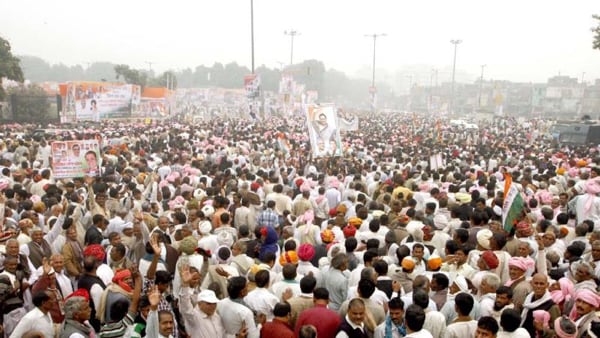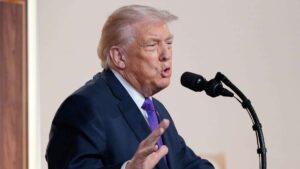President Donald Trump has long touted his negotiating abilities, but recent setbacks in lower courts have begun to hinder his capacity to leverage those skills effectively.
Since January, Trump has faced numerous legal defeats that have slowed his efforts to reshape policy according to his agenda. While the administration has occasionally succeeded in pausing some judicial decisions on appeal—often seeking the intervention of the U.S. Supreme Court—ongoing court losses loom over negotiations related to various issues, including trade and higher education.
Trump himself noted that a ruling against his administration in a significant tariff case would diminish U.S. leverage. He indicated that he might consider “unwinding” trade agreements with the European Union, Japan, and South Korea if the Supreme Court rules against his tariffs, warning that the nation could “suffer so greatly” from the loss of tariff revenue.
Additionally, the president stated that an endorsement of his tariffs by the Supreme Court is critical for maintaining U.S. wealth and for negotiating peaceful resolutions to global conflicts. “You’ll have tremendous power to negotiate, the use of tariffs,” he told reporters on Sept. 16 before his departure for the UK, claiming he had been able to resolve four wars through his tariff strategies, a statement that critics have questioned.
In a high-stakes situation involving significant government revenue, a federal court ruled that Trump’s nation-based reciprocal tariffs are illegal. An appeals court upheld that decision but allowed the government to enforce the tariffs pending litigation. The Supreme Court has agreed to expedite the case with arguments scheduled for Nov. 5.
Trump has expressed that an unfavorable ruling from the Supreme Court would limit his ability to negotiate trade agreements with reluctant nations. Treasury Secretary Scott Bessent noted on CNBC that the Supreme Court is generally “very reluctant to overrule a president’s signature policy.”
In a separate conflict concerning higher education, only three prestigious universities have reached agreements with the government to restore federal funding after the Trump administration cut billions in research grants. Six other universities, including Harvard—which prevailed in district court against the funding freeze—are still in negotiations.
Legal firms such as Perkins Coie, which have challenged Trump’s executive orders aimed at punishing firms deemed political adversaries, have won cases in court, constraining the administration’s ability to mandate settlements requiring pro-bono work aligned with its policies, including the cessation of diversity initiatives.
Plans to deploy the National Guard in cities led by Democratic officials have also been on hold following a judge’s ruling that Trump broke federal law by deploying troops against California Governor Gavin Newsom’s wishes. The District of Columbia has also filed a lawsuit concerning the National Guard’s deployment in the capital.
Trump’s efforts to exert more control over the Federal Reserve have encountered significant legal hurdles, with courts blocking his attempt to remove Lisa Cook from the central bank. The Supreme Court is also expected to consider this matter.
Michael Bitzer, a professor of history and politics at Catawba College, remarked on the uncertainty surrounding the president’s capabilities. “You’re in a state of confusion. That uncertainty and that potential level of chaotic understanding of presidential power is a blanket issue.”
Despite this, Trump has maintained a confident public demeanor, citing his Supreme Court successes as evidence that his agenda remains secure. The conservative majority of the court has temporarily allowed the administration to execute federal firings and funding cuts, suggesting a tendency to ultimately side with Trump in upcoming cases.
Abigail Jackson, a White House spokeswoman, claimed, “The Trump administration’s policies have been consistently upheld bythe Supreme Court as lawful despite an unprecedented number of legal challenges and unlawful lower court rulings.” She characterized decisions against Trump as stemming from “liberal activist judges.”
On a recent Monday, the Supreme Court upheld, at least temporarily, Trump’s termination of Federal Trade Commissioner Rebecca Slaughter.
However, many of Trump’s victories at the Supreme Court have been temporary, introducing additional uncertainty regarding their long-term effectiveness.
Political analysts are closely observing the implications of the ongoing legal battles on Trump’s agenda. Democratic strategist Maria Cardona highlighted that the cascade of court decisions could contribute to a chaotic perception of the administration’s policy approach, noting that polling indicates widespread unpopularity of Trump’s inconsistent tariff regime.
“Chaos is what this administration’s policy prescriptions are for the American people, and they don’t like it,” Cardona remarked.
Conversely, Republican strategist Lisa Camooso Miller noted that many Americans are adapting to Trump’s governing style and policies. “Regardless of what the law says, I think you’ll find that a lot of people are already making adjustments based on the inevitability of it happening,” she asserted.
This report includes information from Zoe Tillman and Liam Knox.
This article was generated from an automated news agency feed without modifications to text.










